RARE! WWII 1943 USS Allen M. Sumner (DD-692) CONFIDENTIAL Blueprint Lt. Jensen USN
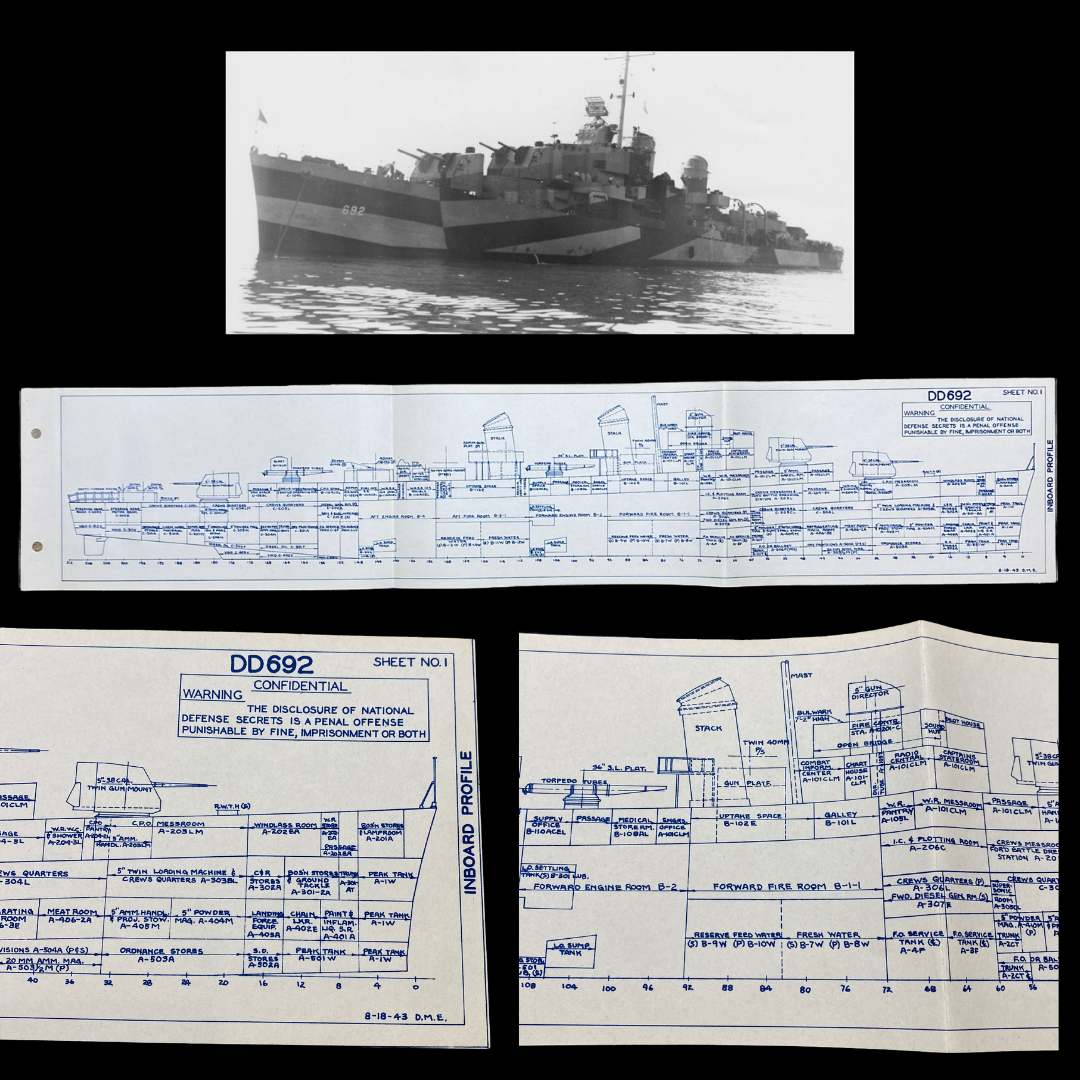

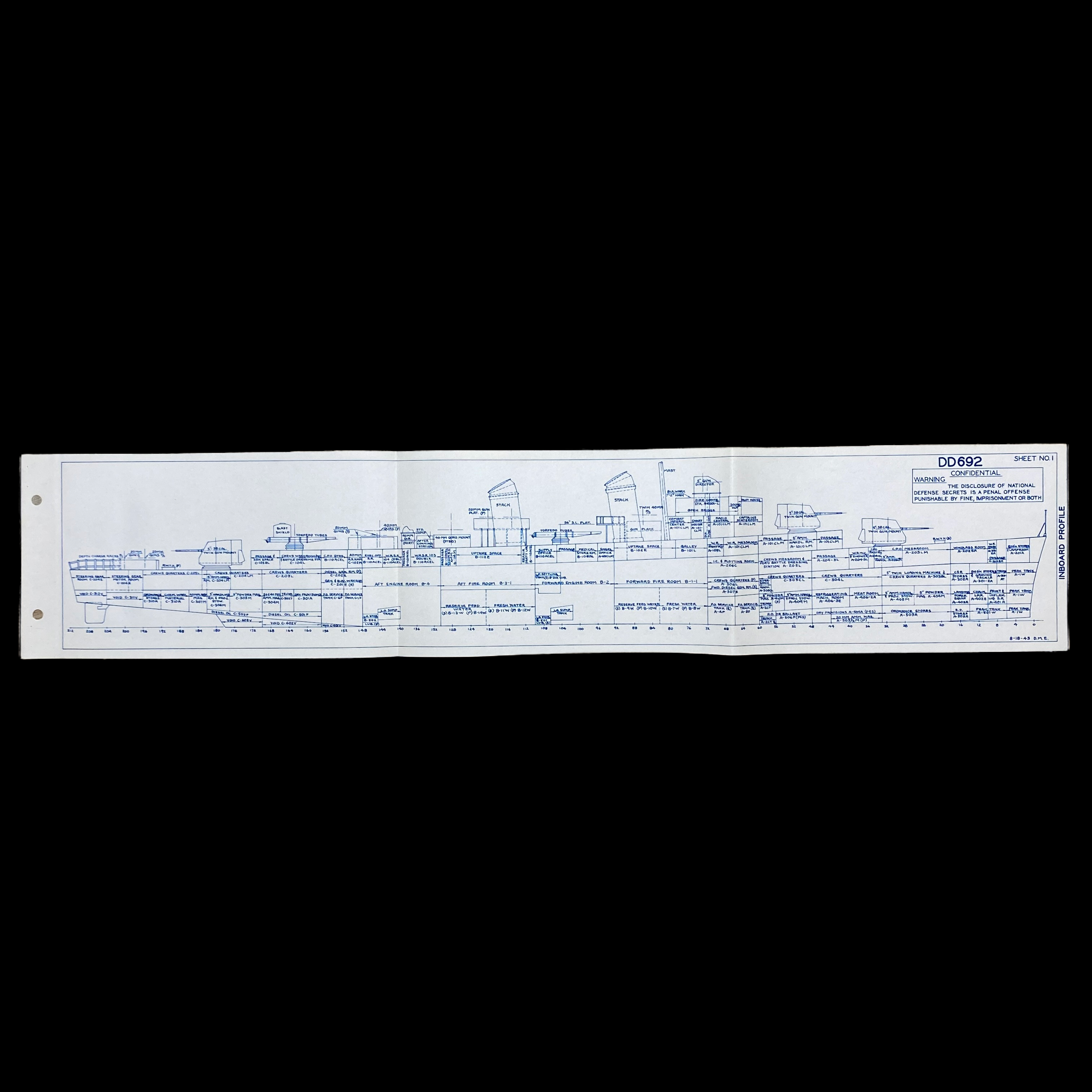
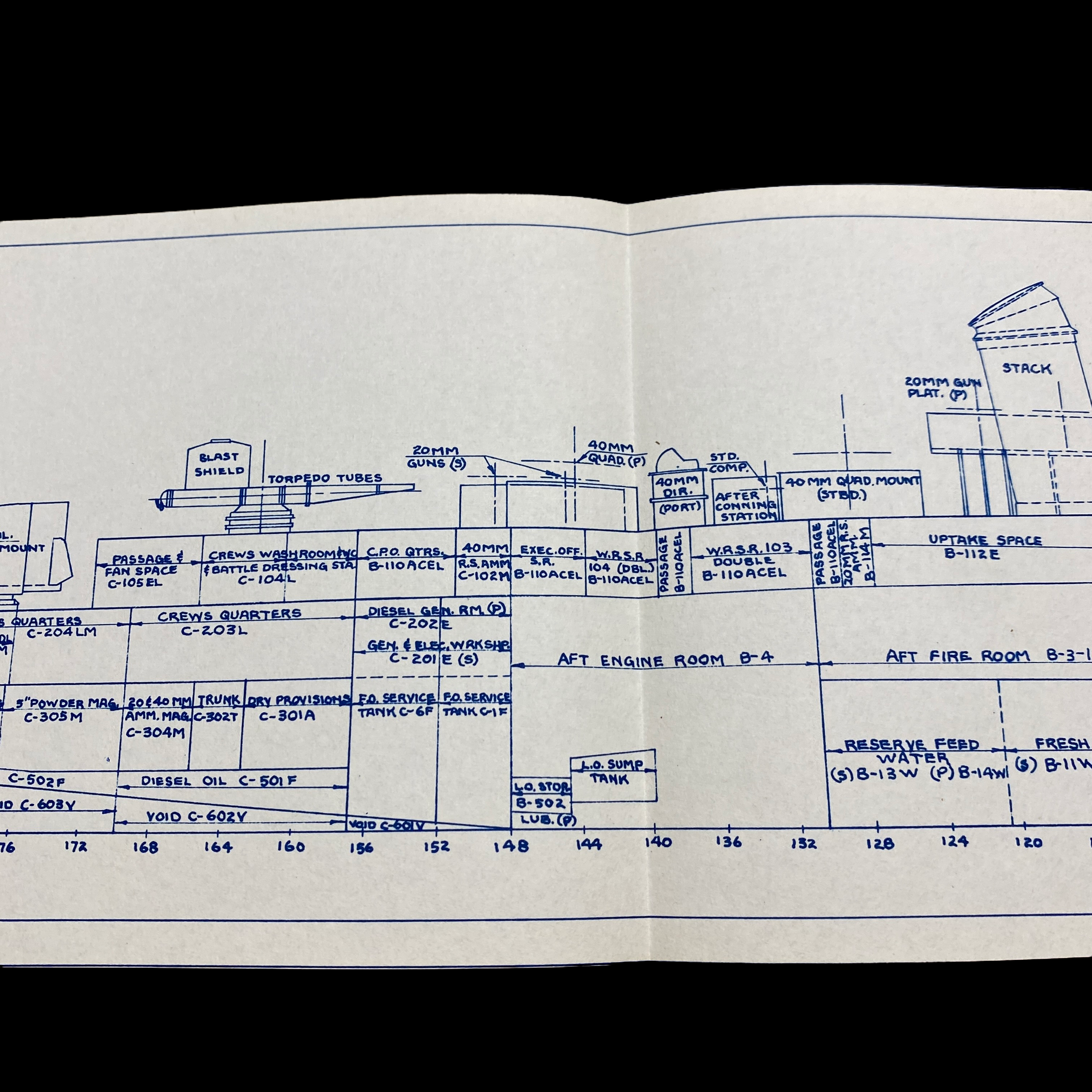
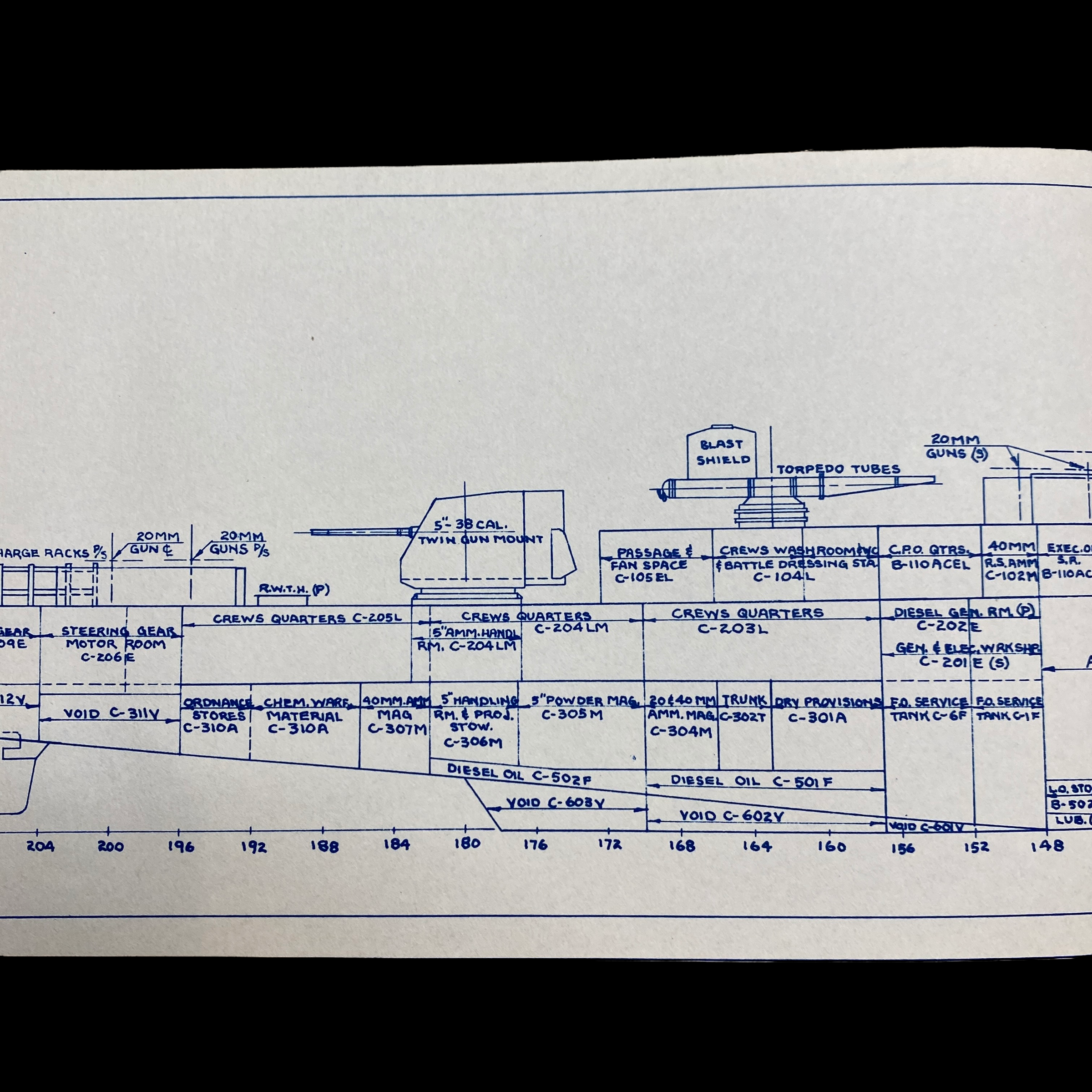
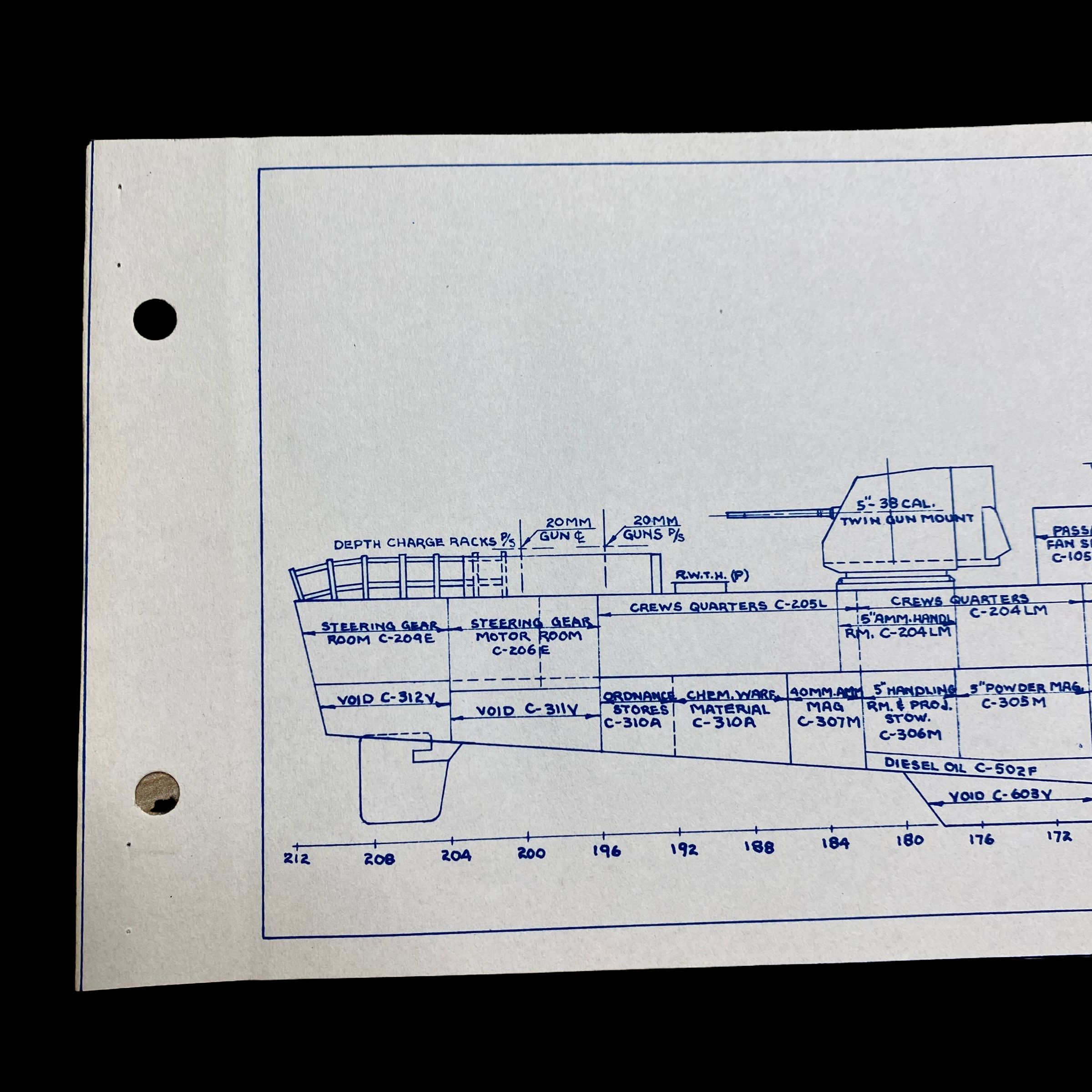
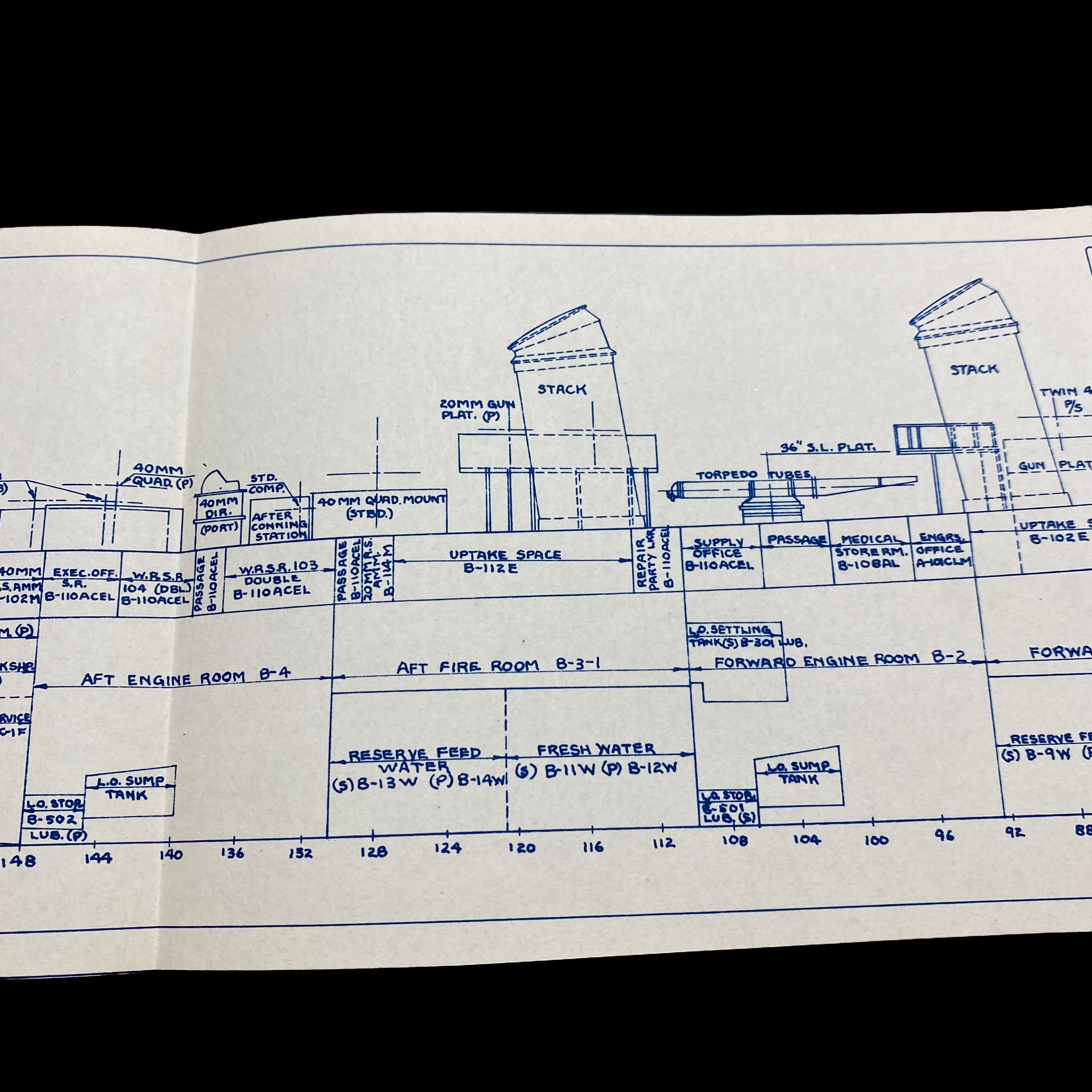
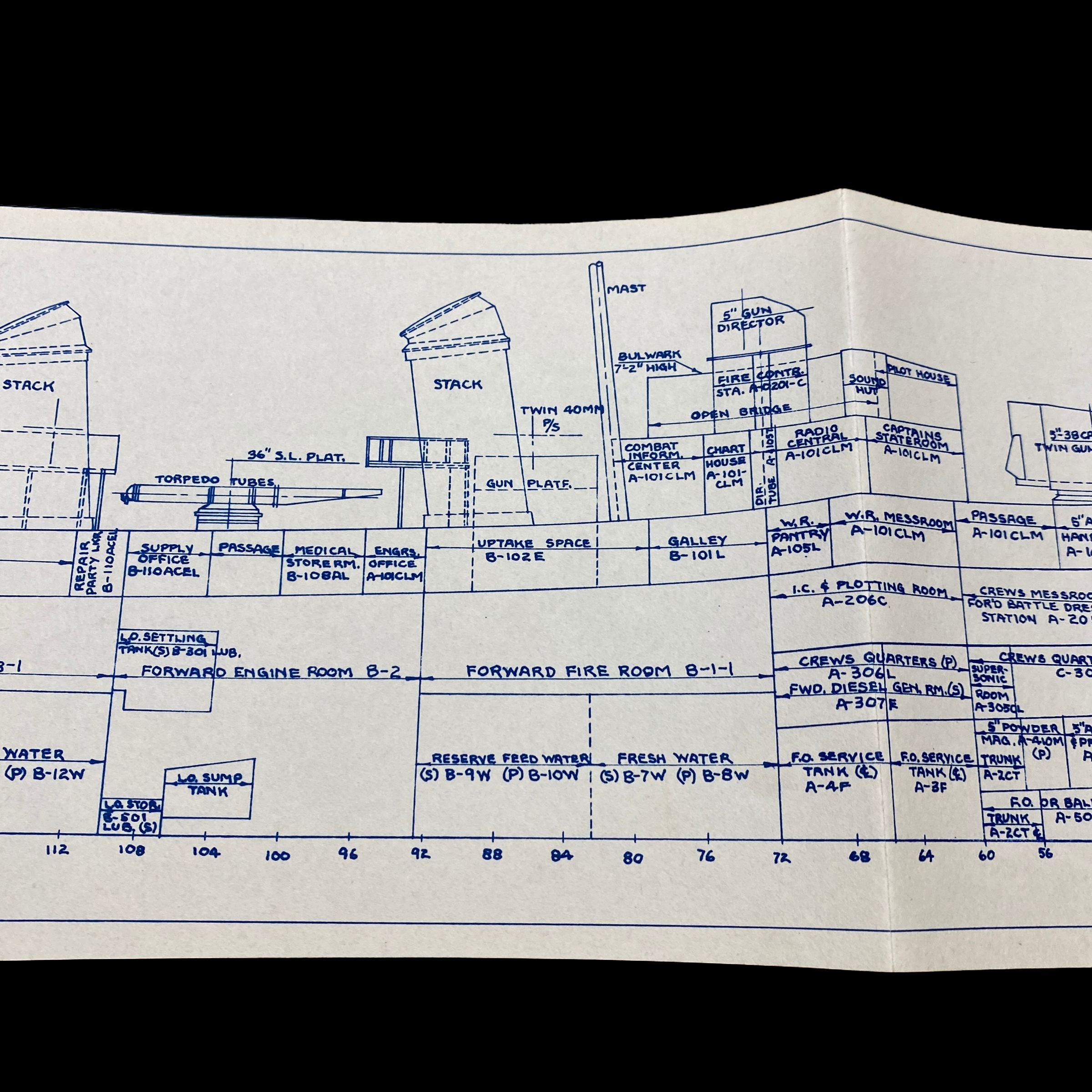
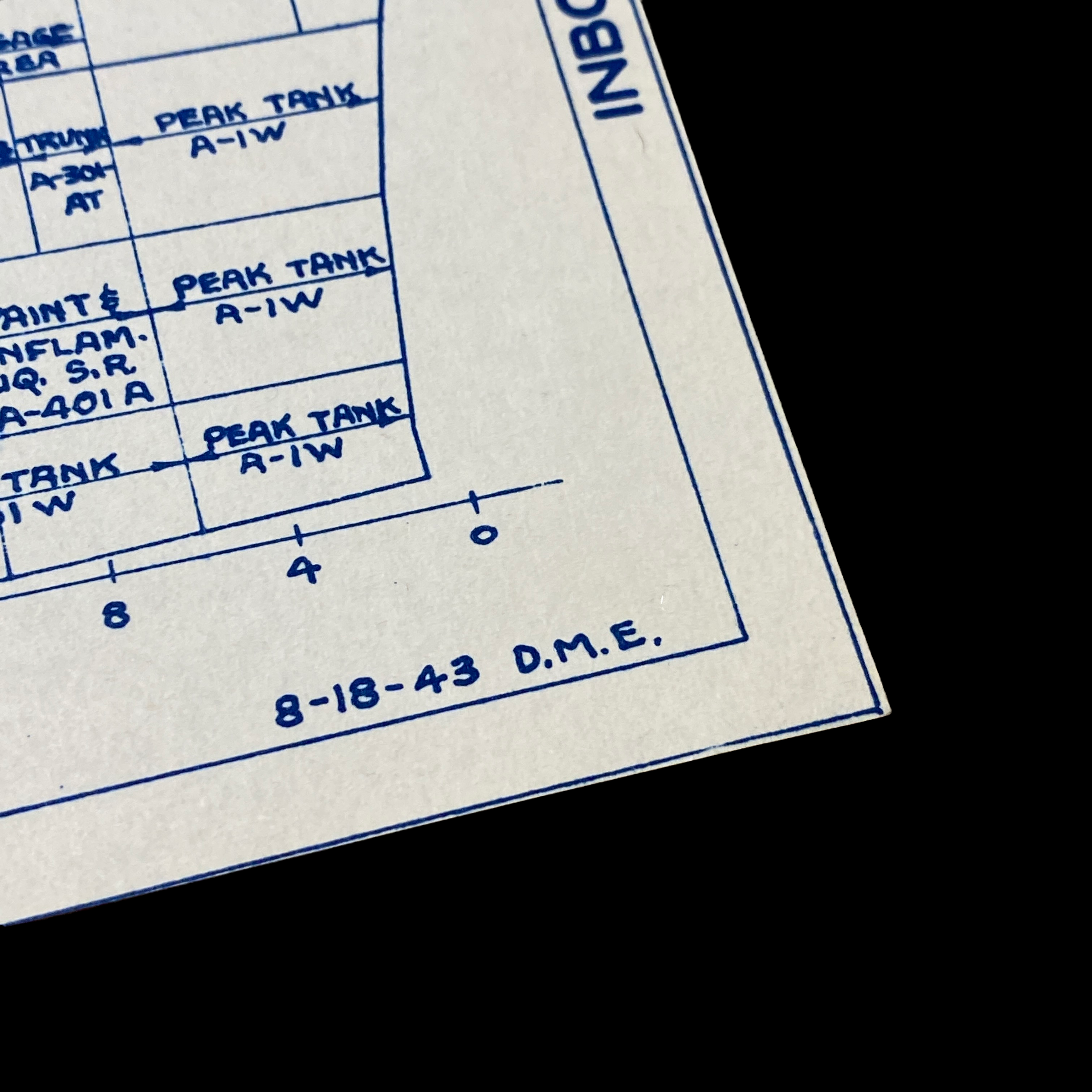
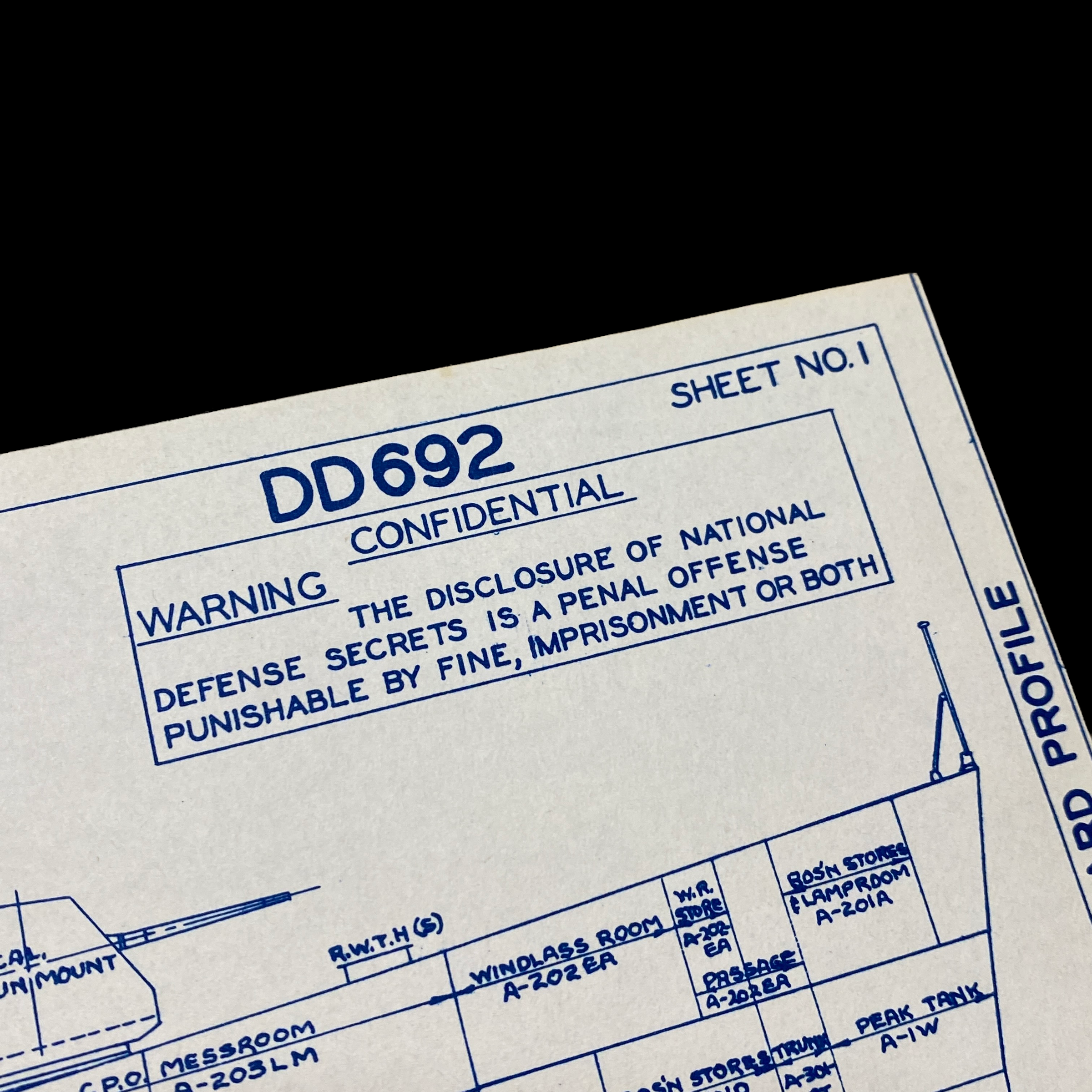
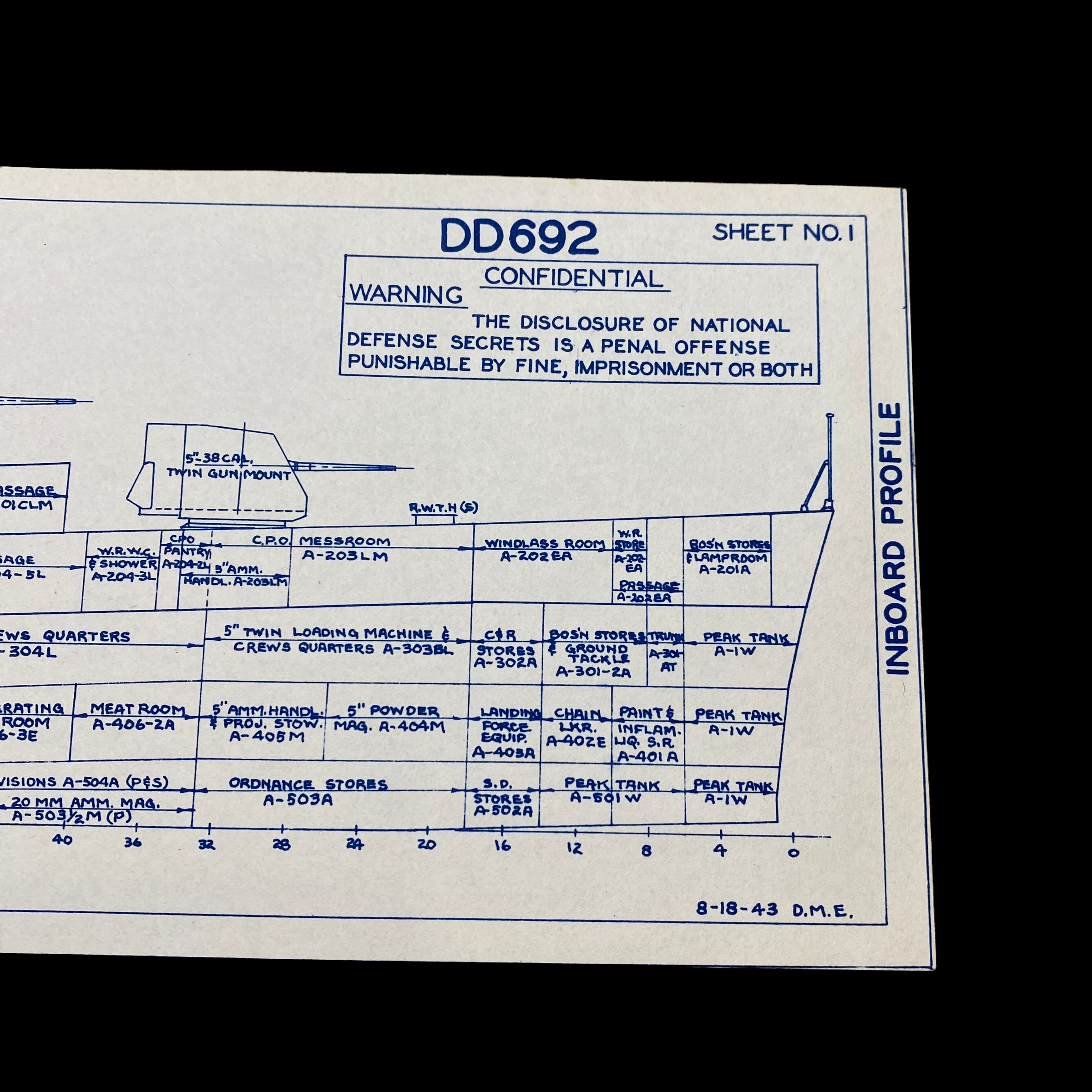
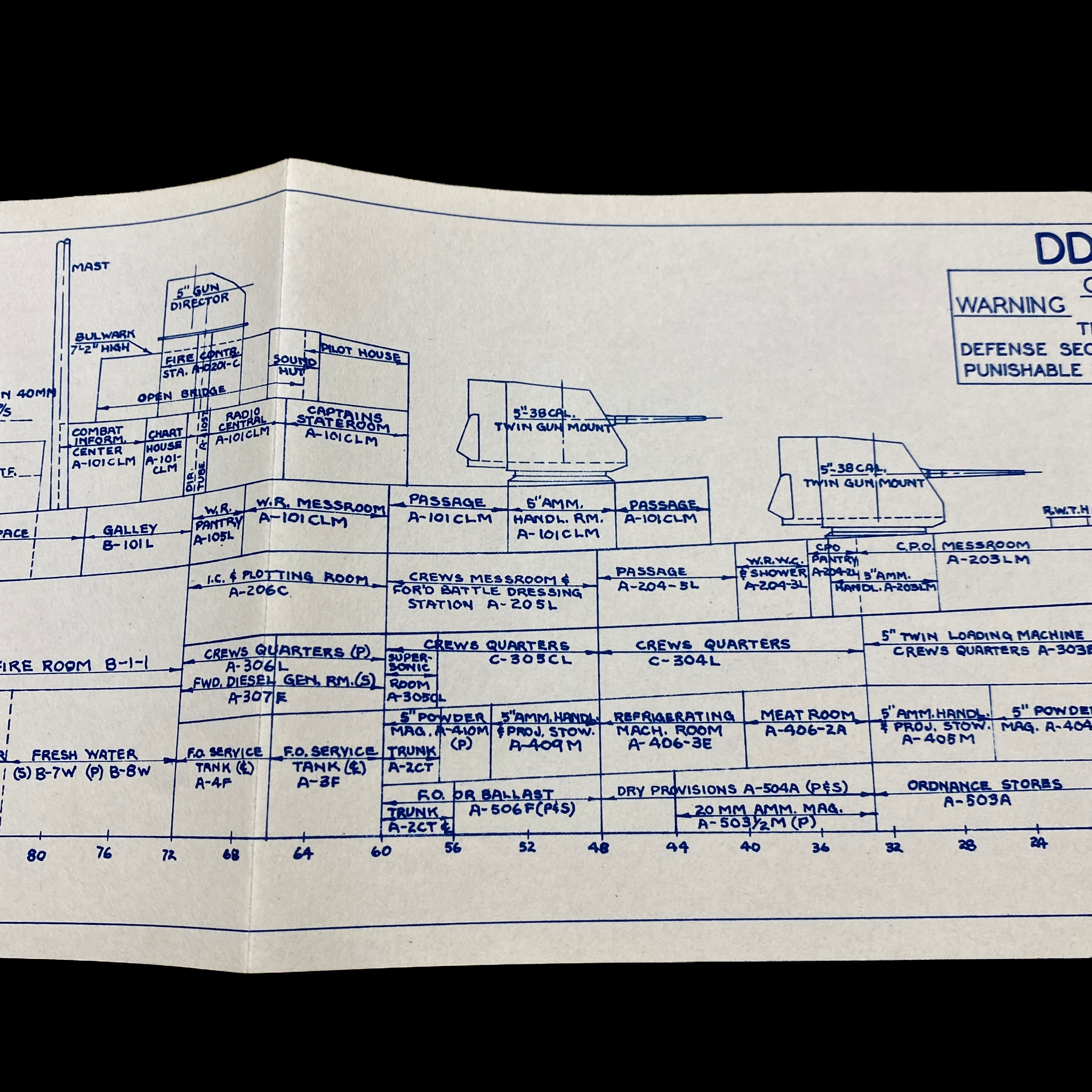
RARE! WWII 1943 USS Allen M. Sumner (DD-692) CONFIDENTIAL Blueprint Lt. Jensen USN
Comes with hand-signed C.O.A.
This incredible and museum-grade 1943 WWII Naval ‘COMPARTMENT SKETCH’ constructional blueprint of the USS Allen M. Sumner (DD-692) is marked CONFIDENTIAL and was issued to Lt. Jensen of the Supervision of Shipbuilding, US Navy Yard. USS Allen M. Sumner (DD-692) was the lead ship of her class of destroyers.
This was a very closely guarded and secretive blueprint of the DD692 class and is marked “CONFIDENTIAL - WARNING - THE DISCLOSURE OF NATIONAL DEFENSE SECRETS IS A PENAL OFFENSE PUNISHABLE BY FINE, IMPRISONMENT, OR BOTH”.
This sketch blueprint is dated August 18th, 1943 and has the sketch initials signed in the bottom right.
*This sale is for the original USS Allen M. Sumner (DD-692) blueprint. The black and white photo on the cover image of the USS Allen M. Sumner (DD-692) is a digital historical photo of the USS Allen M. Sumner (DD-692) in combat during WWII and are used to show the ships extensive WWII history!
USS Allen M. Sumner (DD-692) Campaign History (1944):
USS Allen M. Sumner (DD-692) steamed out of Pearl Harbor in company with the battleship North Carolina, bound for duty in the western Pacific with the Fast Carrier Task Force. Steaming via Eniwetok, the destroyer entered Ulithi lagoon on 5 November. Allen M. Sumner remained at Ulithi until 19 November at which time she departed the atoll to join Task Group (TG) 38.4 at sea.
After rendezvousing with the carriers, she accompanied them to waters near Yap Island whence the aircraft carriers launched air strikes on 22 November before reentering Ulithi that same day. The destroyer remained there for 5 days and then returned to sea, bound for newly invaded Leyte in the Philippines.
She arrived in San Pedro Bay on 29 November and began patrolling Leyte Gulf. That duty—punctuated intermittently by air alerts—lasted until the evening of 2 December when Allen M. Sumner set course for Ormoc Bay in company with the destroyers Moale and Cooper.
Reports from American aircraft earlier that day had indicated that an enemy reinforcement convoy was entering the bay that night, and the three warships were sent to destroy it. Just after 2300 that night, the destroyers suffered the first of many air attacks when a Mitsubishi Ki-46 "Dinah" – a fast, twin-engine, reconnaissance plane – dropped a bomb which near-missed Allen M. Sumner about 30 yards (27 m) from the ship's starboard bow, pierced her hull with fragments, and started a fire on board. Bomb fragments also wounded one officer and 12 men.
Air attacks continued; but, just after midnight, the three destroyers made surface radar contact on a pair of Japanese destroyers later identified as Kuwa and Take. Less than 10 minutes into the battle, Kuwa succumbed to the combined fire of the two destroyers, and the wrecked and burning mass began to sink. Take, however, evened the score just as Allen M. Sumner and Cooper joined Moale in firing on the remaining Japanese warship. One of her torpedoes slammed into Cooper amidships, broke that American destroyer's back, and sank her almost immediately. Less than half of Cooper's crew managed to get off the ship. Most of those were later rescued—but by PBY Catalinas rather than by Cooper's division mates who were still being subjected to heavy shore battery fire and air raids. Any attempt at rescue by Allen M. Sumner and Moale would have made them virtually stationary targets. At about 0145 on the 3rd, the two remaining American warships began retirement from Ormoc Bay and set a course for San Pedro Bay where they arrived later that day.
Allen M. Sumner spent the next nine days in San Pedro Bay undergoing upkeep and repairing the minor damage that she had suffered in the action at Ormoc Bay. Though the area was subjected to intermittent air raids throughout that period, Allen M. Sumner recorded only one, long-range—in excess of 9,000 yards (8,200 m)—approach by an enemy aircraft on 6 December. On 12 December, she departed San Pedro Bay and joined the screen of TG 78.3, bound for the landings on Mindoro Island. That task group constituted Rear Admiral Arthur D. Struble's Mindoro Attack Group. Although the group came under air attack during the transit, Allen M. Sumner escaped damage. On 15 December, she moved in with the close covering group to participate in the preinvasion shore bombardment, and the subsequent landings went forward against negligible opposition. Some enemy aircraft attempted to attack the invasion force, and Allen M. Sumner joined Moale and Ingraham in splashing an enemy light bomber. On the following day, the destroyer departed Mindoro to return to Leyte where she arrived on 18 December. Between 26 and 29 December, the warship escorted a resupply echelon to Mindoro and back to San Pedro Bay.
USS Allen M. Sumner (DD-692) Campaign History (1945):
On 2 January 1945, the destroyer stood out of San Pedro Bay, bound for the invasion of Luzon at Lingayen Gulf in the screen for the cruisers and battleships of Vice Admiral Jesse B. Oldendorf's Bombardment and Fire Support Group (TG 77.2). Early on 6 January, Allen M. Sumner moved into Lingayen Gulf to support minesweeping operations. Around noon, her unit came under air attack by kamikazes. The first plane retreated in the face of a heavy antiaircraft barrage while the second attacker hovered just out of range as a decoy to mask a run in by a third suicider. The latter plane dove on Allen M. Sumner strafing as he came. He swooped in out of the sun on the destroyer's port bow and crashed into her near the after stack and after torpedo mount. The warship lost 14 men killed and 19 injured. Extensive damage required her to retire from the gulf and join the heavy units of TG 77.2. Nevertheless, Allen M. Sumner remained in action with that unit and supported the Lingayen operation until 14 January.
On that day, she began a long and somewhat circuitous voyage back to the United States for repairs. She arrived at Manus in the Admiralties on 18 January and remained there for nine days. She got underway again on 27 January in company with the escort carrier Kadashan Bay and, after stopping at Majuro en route, arrived in Pearl Harbor on 6 February. She departed Oahu the next day and arrived at Hunters Point, California, on 13 February to begin repairs. Her renewal work was completed on 10 April and, four days later, she began duty training prospective destroyer crews along the west coast. Just over three months later, on 17 July, she was relieved of training duty and departed San Francisco to return to the western Pacific. The destroyer arrived at Oahu on the 23rd and began three weeks of training operations out of Pearl Harbor.
On 12 August, Allen M. Summer stood out of Hawaii to return to the war zone. However, when she was two days out, the Japanese capitulated. Nevertheless, the warship continued her voyage west. Following a two-day stop at Eniwetok, she got underway again on 21 August and, six-days later, rendezvoused with TG 38.3 in Japanese waters. After some three weeks of postwar patrols, first with TG 38.3 and later with TG 38.1, the destroyer put into Tokyo Bay on 16 September. She remained there only six days before getting underway for the Marianas on 22 August. The ship reached Saipan three days later but soon resumed her voyage back to the United States arriving on the west coast in October and assuming duty as a training platform for prospective destroyer crews.